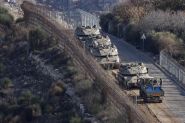
The question of Hezbollah’s weapons cannot be resolved solely within Lebanon. As an ideological, military and political extension of Iran, Hezbollah’s arsenal is intrinsically linked to broader regional dynamics, especially the power balance between Tehran and Washington. Experts agree that local initiatives will be ineffective unless supported by decisions at the highest regional level.
Nonetheless, with rising security concerns and mounting frustration over stalled progress, neither the international community nor Lebanese authorities can remain passive. Taking a clear stance, even if symbolic, is crucial to maintaining Lebanon’s place at the regional negotiation table.
A new countdown has begun. Within Beirut’s political circles, a “confidential” roadmap attributed to US special envoy for Syria Thomas Barrack is circulating. Barrack, seen as a key architect of Lebanon’s future regional order, visited the country on June 19.
His ambitious plan aims to disarm Hezbollah, restore full state sovereignty and secure Lebanon’s borders with Israel and Syria. The approach is twofold: Lebanon takes steps, followed by reciprocal gestures from Israel.
According to several sources consulted by This is Beirut, Lebanon must respond decisively by July—or at the latest, September—or face serious repercussions. Barrack is expected to meet Lebanese officials on July 7, with Washington demanding a definitive position on Hezbollah’s weapons monopoly.
A debate is anticipated within the Council of Ministers soon—possibly as early as Friday—potentially resulting in a vague, non-binding statement reaffirming Lebanon’s commitment to securing the state’s exclusive right to armed force by the end of 2025, echoing President Joseph Aoun’s inaugural speech and the government’s ministerial declaration.
Parliament Speaker Nabih Berri reportedly supports this cautious approach. Without an agreement with Hezbollah and aiming to buy time, Berri is seeking a general statement without immediate obligations. Sources indicate that this could serve as a “gesture of goodwill” upon Barrack’s return.
However, Washington’s message is clear: delays risk leaving Lebanon to face escalating tensions alone, potentially triggering renewed Israeli hostilities and harsher international sanctions. As one security official put it, “If the Lebanese state fails to act, the Israelis will eventually do the job themselves.”
What Does Barrack’s Roadmap Entail?
Barrack’s plan seeks to reshape Lebanon’s internal and regional power balance. Sources confirm three key objectives:
-
Gradual disarmament of Hezbollah;
-
Restoration of exclusive Lebanese state authority across all territory;
-
Redefinition of Lebanon’s borders and relations with Syria and Israel.
The plan was presented to President Aoun, Prime Minister Nawaf Salam and Speaker Berri. It stresses urgent, decisive action, reflecting past unsuccessful attempts since the November 27, 2024, ceasefire. No concrete progress has been achieved since.
The proposal rests on three pillars:
Security: The US demands the disarmament of all militias, including Hezbollah and Palestinian factions, not just south of the Litani River, but across the entire Lebanese territory. The state, through the Lebanese army, must be the sole armed force.
Institutional and Economic Reform: Deep state reforms are required, including public administration modernization, judiciary restructuring and privatization of sectors such as electricity, telecommunications and water.
Geopolitical: Lebanon must negotiate formal border agreements with Syria and Israel to secure territorial sovereignty and to finalize the border delineation with Israel. In exchange, Israel would gradually withdraw from five strategic positions in southern Lebanon and release between 30 and 50 Hezbollah prisoners. International support for Lebanon’s reconstruction is also part of the plan. However, the American demands are far from straightforward for the authorities in Beirut.
Lebanon’s Response: Cautious and Divided
Reactions in Beirut are mixed. President Aoun and Prime Minister Salam approach the roadmap cautiously. The Lebanese Army is reportedly willing to cooperate if granted strong political support and national consensus.
Resistance mainly comes from the Amal-Hezbollah duo. While Hezbollah has not issued an official stance, insiders say a counterproposal is under consideration. This alternative includes several conditions likely to be rejected by Israel: immunity from prosecution after disarmament (due to fears of charges related to illicit funding and drug trafficking), guarantees against possible Syrian retaliation (especially since Bashar al-Assad is no longer in power), the reintegration or reassignment of roughly 30,000 Hezbollah fighters and, most importantly, a prior Israeli withdrawal from occupied territories.
Speaker Nabih Berri, closely allied with Hezbollah, seeks to delay action, proposing a three-month moratorium to negotiate weapon handover terms. A government source warns that such delays clash with Washington’s urgency: “The era of gradual compromise is over. The regional Israel-Iran conflict has changed the stakes.”
Iran, the Invisible Player
Behind the scenes, a crucial question persists: Can Hezbollah independently decide to relinquish its weapons? The fate of Hezbollah’s arsenal is deeply intertwined with ongoing negotiations between Tehran and Washington, reportedly set to take place on Wednesday in Doha, according to diplomatic sources.
Last Tuesday, the Qatari Prime Minister urged the US and Iran to resume talks on the nuclear issue following former President Donald Trump’s announcement of a ceasefire between Tehran and Israel.
In this equation, Hezbollah’s military capabilities remain a strategic asset controlled by Iran. “There will be no Lebanese solution without regional approval,” says a source close to the matter. “In other words, it’s neither Berri, Salam nor president Aoun who holds the key to disarmament, but the highest levels of Iranian leadership.”
This means that the final decision is not made in Beirut but in Tehran. As Iran’s regional proxy, Hezbollah cannot unilaterally agree to disarm without explicit consent from the Iranian regime. The upcoming talks between Tehran and Washington are therefore critical, with Hezbollah’s weapons serving as a key bargaining chip for Iran. This dynamic severely restricts Lebanon’s ability to make progress unless a regional compromise is achieved.




Comments